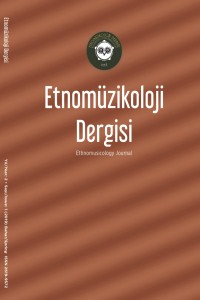Abstract
The article is an expose' of how hegemony and music belonging to the Shona communities of Zimbabwe have transcended the pre-colonial, colo- nial and post-colonial periods. The discussion is premised on some onto- logical comprehension that supremacy, socio-economic and political do- minance by members of a community are aspects of power dynamics and hegemony. As such the world communities are characterized by class struggle in which the 'haves', who enjoy hegemony superimpose on the 'have-nots'. Communities are in a dilemma of trying to reduce the gap between the ‘haves’ and ‘have-nots’. In this study, a qualitative ethnograp- hic methodology was carried out among some Shona communities of Zim- babwe. The findings were that music portrays socio-economic and political hegemonies during the pre-colonial, colonial and post-colonial Zimbabwe. It was also established that there is a strong relationship between music and hegemony. Music, especially song and dance were used to achieve socio- economic and political dominance during the three eras.
Keywords
References
- Agawu, C. 2003. Representing African Music. New York: Tailor and Francis Bo- oks, Inc.
- Banana, C. S. 1991. A Century of Methodism in Zimbabwe 1891-1991. Gweru: Mambo Press.
- Blacking, J. 1973. How musical is Man? Seattle and London: University of Was- hington Press.
- Bourdillon, 1990. Religion and society: A text for Africa. Gweru: Mambo Press. Gelfand, M. 1999. The genuine Shona. Gweru: Mambo Press.
- Gelfand, M. 1962. Shona Religion. With Special reference to the Makorekore. Cape Town et al: Juta and Co., Ltd.
- Gundani, P. 1994. “The Roman Catholic church and kurova guva ritual in Zimbabwe.” Zambezia 21:2 pp. 123 - 146.
- Jones, C. 2008. “Shona Women Mbira Players: Gender, Tradition and Nation in Zimbabwe.” Ethnomusicology Forum. 17:1 pp 125 to 149.
- Kaemmer, J. E. 1995. Music in Human Life. USA: University of Texas Press. Matiure, P. 2009. The Relationship between Mbira Dzavadzimu modes and Shona ancestral spirit possession. M Music Thesis, University of KwaZuluNatal.
- Maxwell, D. 1995. "Witches, Prophets and Avenging Spirits: The Second Christian MovementinNorth-EastZimbabwe".JournalofReligioninAfrica.25:3 pp. 309-339.
- Nzewi, M. 2007. A Contemporary study of Musical Arts informed by African indigenous knowledge system Vol 4; Illuminations, reflections and explorations. Pretoria: Ciimda
- Rutsate, J. 2007. Performance of mhande song-dance: A contextualized and Comparative Analysis. Masters’ Thesis, Rhodes University.
- Wallace, A. F. C. 1966. Religion: An Anthropological View. New York: McGraw Hill.
Abstract
Bu makale, Zimbabwe'deki Shona topluluklarına ait hegemonya ve müziğin sömürgecilik öncesi, sömürgeci ve sömürgecilik sonrası dönemleri nasıl geçtiğini ortaya koyuyor. Tartışma, toplumun üstünlüğünün, sosyo-ekonomik ve politik baskınlığının, güç dinamikleri ve hegemonya yönleri olduğuna dair ontolojik bir anlayış üzerine kuruludur. Bunun gibi, dünya toplulukları, hegemonyayı seven “sahiplerin” üzerine bindiği “zenginlerin” sınıf mücadelesi ile nitelenir. Topluluklar, "iyi olanlar" ile "yok" lar arasındaki açığı azaltma çabasındadır. Bu çalışmada, Zimabwe'nin Shona topluluklarının bazılarında nitel bir etnografik metodoloji uygulanmıştır. Bulgular, müziğin sömürge öncesi, sömürge ve sömürge sonrası Zimbabwe sosyo-ekonomik ve politik hegemonyaları canlandırdığı üzerinedir. Ayrıca müzikle hegemonya arasında güçlü bir ilişki olduğu tespit edilmiştir. Üç dönem boyunca sosyo-ekonomik ve politik baskınlığı elde etmek için müzik, özellikle şarkı ve dans kullanılmıştır.
Keywords
References
- Agawu, C. 2003. Representing African Music. New York: Tailor and Francis Bo- oks, Inc.
- Banana, C. S. 1991. A Century of Methodism in Zimbabwe 1891-1991. Gweru: Mambo Press.
- Blacking, J. 1973. How musical is Man? Seattle and London: University of Was- hington Press.
- Bourdillon, 1990. Religion and society: A text for Africa. Gweru: Mambo Press. Gelfand, M. 1999. The genuine Shona. Gweru: Mambo Press.
- Gelfand, M. 1962. Shona Religion. With Special reference to the Makorekore. Cape Town et al: Juta and Co., Ltd.
- Gundani, P. 1994. “The Roman Catholic church and kurova guva ritual in Zimbabwe.” Zambezia 21:2 pp. 123 - 146.
- Jones, C. 2008. “Shona Women Mbira Players: Gender, Tradition and Nation in Zimbabwe.” Ethnomusicology Forum. 17:1 pp 125 to 149.
- Kaemmer, J. E. 1995. Music in Human Life. USA: University of Texas Press. Matiure, P. 2009. The Relationship between Mbira Dzavadzimu modes and Shona ancestral spirit possession. M Music Thesis, University of KwaZuluNatal.
- Maxwell, D. 1995. "Witches, Prophets and Avenging Spirits: The Second Christian MovementinNorth-EastZimbabwe".JournalofReligioninAfrica.25:3 pp. 309-339.
- Nzewi, M. 2007. A Contemporary study of Musical Arts informed by African indigenous knowledge system Vol 4; Illuminations, reflections and explorations. Pretoria: Ciimda
- Rutsate, J. 2007. Performance of mhande song-dance: A contextualized and Comparative Analysis. Masters’ Thesis, Rhodes University.
- Wallace, A. F. C. 1966. Religion: An Anthropological View. New York: McGraw Hill.
Details
| Primary Language | English |
|---|---|
| Journal Section | Research Articles |
| Authors | |
| Publication Date | March 30, 2019 |
| Submission Date | January 15, 2019 |
| Published in Issue | Year 2019 Issue: 1 |

